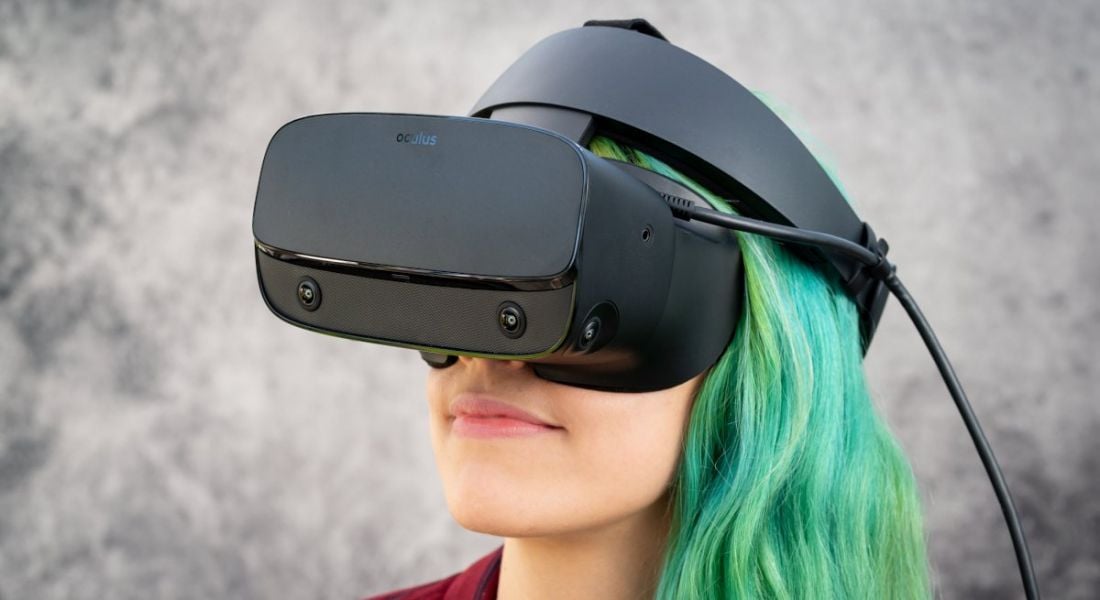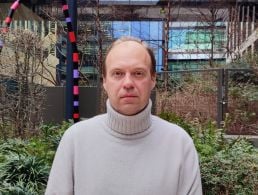Unity’s Antonia Forster discusses her work using AR, VR and everything in between, and why ignoring imposter syndrome is particularly important in the world of emerging technology.
We’ve started hearing a lot about the metaverse and what it means for the future, including how it might affect recruitment and the working world.
But what is it like to actually work within this space? Antonia Forster is an extended reality (XR) technical specialist at video game software development company Unity Technologies, with several years of experience developing XR applications.
In her role at Unity, she works across a variety of industries, from automotive to architecture, creating demos and delivering talks using XR, which encapsulates AR, VR and everything in between.
‘I watch a lot more YouTube tutorials than you might expect’
– ANTONIA FORSTER
If there is such a thing, can you describe a typical day in the job?
It’s challenging to describe a typical day because they vary so much! I work completely remotely with flexible hours. Most of my team are based in the US while I’m in the UK. In order to manage the time difference, I usually start work around 11am and work until 7pm.
Most of my day is spent on developing content, whether that’s using Unity and C# to code a technical demo, creating video content to help onboard new starters with Unity’s tools, or writing a script for a webinar.
Before the pandemic, a role like mine would involve lots of travel and speaking at conferences. But unfortunately, that’s a little more challenging now.
We use a whole range of tools from organisational ones like Asana to manage our projects, to Slack and Google Docs to coordinate with each other, to Unity’s own technical tools to create content.
All of Unity’s XR tools fall under my remit, so I might be creating VR content one day and creating an AR mobile app the next. I also use Unity and C# to create my own projects outside of work. For example, I co-created the world’s first LGBTQ+ virtual reality museum, which has been officially selected for Tribeca Film Festival in June 2022 – during Pride!
What types of project do you work on?
At Unity, my role is to create content that helps people understand our tools and get excited about all the different things it enables them to do. For example, for one project I visited a real construction site and used one of Unity’s tools (VisualLive) to see the virtual model of the building model overlaid on top of the real physical construction.
This makes it very easy to see the difference between the plan and the actual reality, which is very important to avoid clashes and costly mistakes. For another project, I used VR and hand-tracking to demonstrate how someone could showcase a product (say, a car) inside a VR showroom and then interact with it using hand tracking and full-body tracking.
What skills do you use on a daily basis?
The most relevant skill for my role is the ability to break down a larger problem into small steps and then solving each step. That’s really all programming is! That and knowing the right terms to Google to find the solution and enough understanding to implement the solution, or continuing to search if you don’t understand that solution or it is not appropriate for your problem.
Despite my title, I don’t think of myself as highly ‘technical’. I’m an entirely self-taught software developer, and I’m a visual learner, so I watch a lot more YouTube tutorials than you might expect!
Another crucial skill is persistence because VR and AR are emerging and fast-moving technologies that are constantly changing. If I follow a tutorial or try a solution and it doesn’t work, I used to grapple with the feeling that maybe I’m not good enough.
In reality, this technology changes so often that if a tutorial is six months old, it might be out of date. Learning to be resilient and persistent and to ignore my feelings of imposter syndrome was the most important thing I’ve learned on my career journey. Your feelings are not facts, and imposter syndrome is extremely common in this industry.
What are the hardest parts of your working day?
One of the most difficult challenges of my working day is the isolation. I work remotely and many of my team are on a different time zone, so we’re not always able to chat. To overcome that, I prioritise social engagements outside of work.
When I’m extremely busy with my own projects – like the LGBTQ+ VR museum – I go to co-working spaces so that I can at least be around other people during working hours.
I also struggle with time blindness. I have ADHD and working remotely means that it’s easy to get absorbed in a task and forget to take breaks. I set alarms to snap myself out of my ‘trance’ at certain times, like lunchtime. I have to admit though, it doesn’t always work!
Do you have any productivity tips that help you through the day?
My main tip for productivity is to find what works for you, not what works for other people, or what others think should work for you.
For example, I am a night owl. So, starting my day a little later and working into the night, works well for me. It also means I can sync with my team in the US. I don’t find time to play video games, piano or meet up with my friends in the evening, so instead I arrange those things for the morning, which helps me persuade myself to get out of bed!
In the same way, when I was learning to code, people gave me advice like: ‘Break things and fix it, to see how it works’. But that produced a lot of anxiety for me and didn’t work well.
Instead, I learned with my own methods like writing songs, drawing cartoons and even physically printing and gluing code snippets into a notebook and writing the English translation underneath. Code after all, is a language, so I treated it the same way. Find what works for you, even if it’s not conventional!
How has this role changed as this sector has grown and evolved?
I began this role in 2020 and typically – before the pandemic – my job would have been described as a ‘technical evangelism’, which involves a lot of public speaking and travel to conferences.
Of course, that wasn’t really possible, so my role has evolved into creating content of different types – webinars online, videos, onboarding tutorials and technical demos for marketing and sales enablement.
While I really enjoy public speaking, the lack of travel has given me time to get deeply familiar with Unity’s XR tooling and sharpen my technical expertise. This technology is always changing so it’s really important to constantly learn and grow. Luckily, I have an insatiable curiosity and appetite for knowledge. I think all engineers do!
What do you enjoy most about the job?
I have two favourite things about this job. First, the autonomy. Since I have a deep understanding of the tools and our users/audience, I’m trusted to design and propose my own solutions that best meet the user needs.
Secondly, the technology itself. Being able to create VR or AR content is like sorcery! I can conjure anything from nothing. I can create entire worlds that I can step into based only on my imagination. And so can anybody that learns this skill – and it’s easier than you think! That has never stopped being magical and exciting to me, and I don’t think it ever will.
10 things you need to know direct to your inbox every weekday. Sign up for the Daily Brief, Silicon Republic’s digest of essential sci-tech news.




